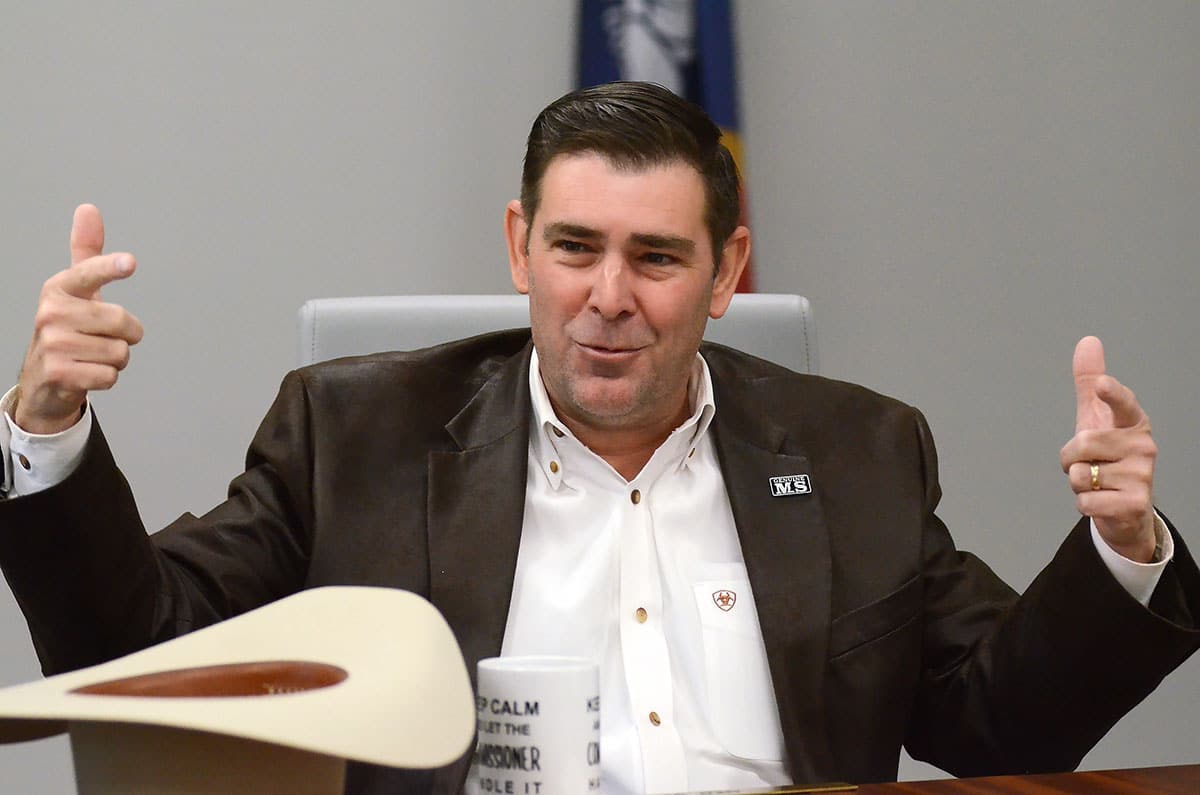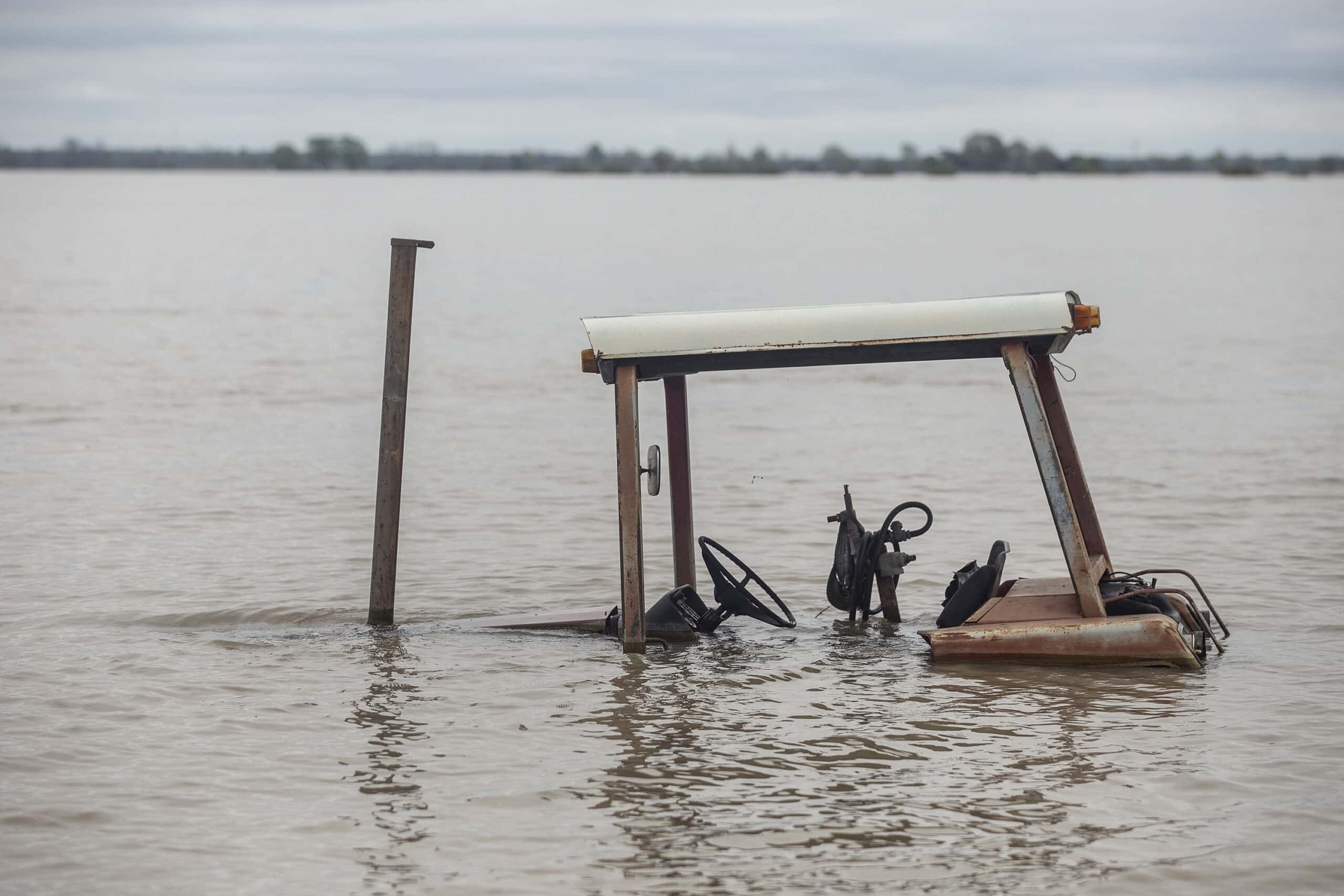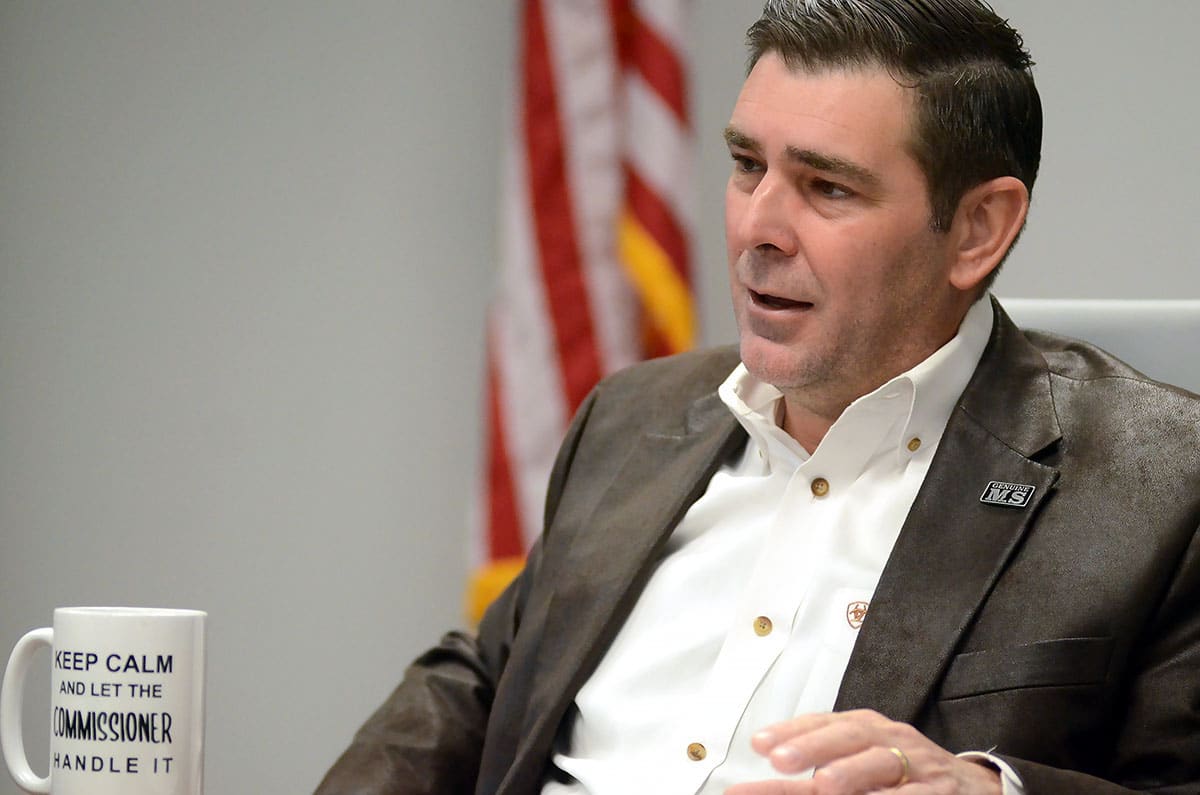Mississippi Today
As agriculture has evolved in Mississippi, the state is losing its ‘middle class’ of farmers

In the early 1930s, Mississippi had over 300,000 farmers, the most ever recorded for the state in federal census records. The last survey, from 2017, listed just around 55,000.
In the 1930s, the average farm size was around 50 acres. Today, it’s over 300 acres.
For decades from the early to mid 20th Century, Black farmers outnumbered white farmers in the state. Today, 86% of Mississippi’s farmers are white.
While agriculture is still the top employer in the state, who farms, what they farm, and who they sell to has changed greatly over the last century. Victim to many of those changes, experts say, is the so-called “middle class” of farmers.
“When we look at the decrease in farms over time, it’s largely that group of farmers, that medium scale,” said John Green, director of the Southern Rural Development Center at Mississippi State University.
Research shows that input costs – for livestock, fertilizer, pesticides, fuel and other needs – have climbed 70% since 1970 when adjusted for inflation. Green explained that those costs leave farmers more at risk, especially with the harmful climate impacts, such as drought and floods, that Mississippi has seen in recent years.
“There’s a lot more vulnerability for those farmers when there’s a bad year, so it makes it harder to stay in the game,” Green said.

Land is also more expensive due to higher demand, making it harder for newer farmers to buy in and easier for older farmers to cash out.
“It’s a story that can be told in every community,” State Agriculture Commissioner Andy Gipson told Mississippi Today. “Grandpa and grandma had a farm, and the family wants to keep the farm. Who’s going to run it? Well, this (kid’s) got another job, that one’s moving off. What happens is the farm sits there, and then, slowly, suburbanization comes along, some developer says, ‘I’ll offer you so much for that land,’ and suddenly they don’t have the reason to keep that farm anymore.”
All of these factors are making it harder for farmers in the middle, Gipson explained: Small farmers, like the ones selling fruits and vegetables to farmers markets, will always have demand. Large operations, with technological advantages like an irrigation system, can weather a bad year.
“Most of our farmers in Mississippi have another job to pay the bills,” Gipson said. “That’s that middle group of farmers. They’re at most risk of getting out (of the business) because there comes a point at which the input costs are so expensive that it’s not worth it financially to keep going.”
But Gipson also pointed out that, despite Mississippi having only a tenth of the number of farms it once had, production from the agriculture sector is at an all-time high. With new technology, he explained, farmers can grow more with the same amount of land.

“The good news is we’ve seen our production of agriculture, as far as the number of products, the amount of products, food and fiber and timber, continue to go up,” Gipson said.
If production is at an all-time high, then why does it matter that Mississippi has only a fraction of the farms and farmers that it used to?
For one, farmers are getting older. As Green and two other MSU researchers wrote about recently, the average age of farmers in the U.S. grew from 50 to 57 since 1978. In Mississippi, the average is 59. Their research looks at barriers for new farmers entering the trade, as well as programs like 4-H trying to engage younger farmers and reverse the aging trend.
But also, the loss of middle-tier farms has disrupted the cultural and economic identity of rural areas around the state.
Carlton Turner, a Utica native, said his grandfather worked for years as a farmer on their family land until, eventually, there wasn’t enough money coming in and he had to find a new job. Today, Turner said, the job opportunities in his hometown are harder to come by.

“A town like Utica, that has a long history of agricultural production, the only industry here is a sawmill,” he said. “And that doesn’t provide enough jobs for the community, so the community has to go out to work in other areas.”
Turner, founder of the Mississippi Center for Cultural Production, is working to revive agricultural interest in rural, predominantly Black areas that have lost farms over the years. The loss of Black farmers in Mississippi, he said, came from both the Great Migration as well as the mechanization of farming, which reduced the need for labor.
“The food system went from being many local producers that were producing for themselves and for their local communities, to consolidating to larger farms and larger, commercial agricultural industries,” he said. “We've yielded a lot of that power away from our communities in which there's few people that are basically creating the industry and the food for many people.”
Turner also emphasized the wellness impacts of losing small and middle-tier farms, especially in one of the least healthy and most food insecure states. Restoring people’s connection with locally grown food would help reverse that trend, he explained.
“We have some of the most fertile land, but our (health statistics are) the lowest in the country,” he said. “That is directly connected to our food systems. We need more farmers producing high quality, locally sourced whole foods because we don't have the quality of health and wellness that we deserve as a state and as a community.”
Other local farmers are also working to fill in the gap Turner mentioned. Cindy Ayers Elliott, for instance, runs the 68-acre Foot Print Farms in Jackson, which aims to bring young people into agriculture and build the supply of locally grown, healthy foods.
In the 1930s, vegetables like sweet potatoes, cabbages, and tomatoes – not including commodity crops like corn and soybeans – made up over 160,000 acres of the state’s farmland, and tens of thousands of farms grew fruit like apples, pears, and peaches. Today, less than 40,000 acres are used for vegetables – again, excluding corn and soybeans – and just a few hundred farms grow fruit.
As far as solutions, Gipson pointed to workforce development programs that the Mississippi Department of Agriculture and Commerce has set up to reach young people, in addition to local 4-H clubs and the state’s Future Farmers of America chapter. He also said a priority is helping family farms set up succession plans, so that farms stay active for future generations.

“Farming today is high technology,” Gipson said, describing the computerized systems now used to harvest timber and row crops. “And it’s our young people who know how to do that. Connecting our young people to farms is the answer, not only for Mississippi's long term economic viability, because agriculture is far and away our largest industry, but also in terms of keeping our young people here.”
This article first appeared on Mississippi Today and is republished here under a Creative Commons license.
Did you miss our previous article...
https://www.biloxinewsevents.com/?p=318350
Mississippi Today
Early voting proposal killed on last day of Mississippi legislative session
Mississippi will remain one of only three states without no-excuse early voting or no-excuse absentee voting.
Senate leaders, on the last day of their regular 2025 session, decided not to send a bill to Gov. Tate Reeves that would have expanded pre-Election Day voting options. The governor has been vocally opposed to early voting in Mississippi, and would likely have vetoed the measure.
The House and Senate this week overwhelmingly voted for legislation that established a watered-down version of early voting. The proposal would have required voters to go to a circuit clerk’s office and verify their identity with a photo ID.
The proposal also listed broad excuses that would have allowed many voters an opportunity to cast early ballots.
The measure passed the House unanimously and the Senate approved it 42-7. However, Sen. Jeff Tate, a Republican from Meridian who strongly opposes early voting, held the bill on a procedural motion.
Senate Elections Chairman Jeremy England chose not to dispose of Tate’s motion on Thursday morning, the last day the Senate was in session. This killed the bill and prevented it from going to the governor.
England, a Republican from Vancleave, told reporters he decided to kill the legislation because he believed some of its language needed tweaking.
The other reality is that Republican Gov. Tate Reeves strongly opposes early voting proposals and even attacked England on social media for advancing the proposal out of the Senate chamber.
England said he received word “through some sources” that Reeves would veto the measure.
“I’m not done working on it, though,” England said.
Although Mississippi does not have no-excuse early voting or no-excuse absentee voting, it does have absentee voting.
To vote by absentee, a voter must meet one of around a dozen legal excuses, such as temporarily living outside of their county or being over 65. Mississippi law doesn’t allow people to vote by absentee purely out of convenience or choice.
Several conservative states, such as Texas, Louisiana, Arkansas and Florida, have an in-person early voting system. The Republican National Committee in 2023 urged Republican voters to cast an early ballot in states that have early voting procedures.
Yet some Republican leaders in Mississippi have ardently opposed early voting legislation over concerns that it undermines election security.
This article first appeared on Mississippi Today and is republished here under a Creative Commons license.
.
Mississippi Today
Mississippi Legislature approves DEI ban after heated debate
Mississippi lawmakers have reached an agreement to ban diversity, equity and inclusion programs and a list of “divisive concepts” from public schools across the state education system, following the lead of numerous other Republican-controlled states and President Donald Trump’s administration.
House and Senate lawmakers approved a compromise bill in votes on Tuesday and Wednesday. It will likely head to Republican Gov. Tate Reeves for his signature after it clears a procedural motion.
The agreement between the Republican-dominated chambers followed hours of heated debate in which Democrats, almost all of whom are Black, excoriated the legislation as a setback in the long struggle to make Mississippi a fairer place for minorities. They also said the bill could bog universities down with costly legal fights and erode academic freedom.
Democratic Rep. Bryant Clark, who seldom addresses the entire House chamber from the podium during debates, rose to speak out against the bill on Tuesday. He is the son of the late Robert Clark, the first Black Mississippian elected to the state Legislature since the 1800s and the first Black Mississippian to serve as speaker pro tempore and preside over the House chamber since Reconstruction.
“We are better than this, and all of you know that we don’t need this with Mississippi history,” Clark said. “We should be the ones that say, ‘listen, we may be from Mississippi, we may have a dark past, but you know what, we’re going to be the first to stand up this time and say there is nothing wrong with DEI.'”
Legislative Republicans argued that the measure — which will apply to all public schools from the K-12 level through universities — will elevate merit in education and remove a list of so-called “divisive concepts” from academic settings. More broadly, conservative critics of DEI say the programs divide people into categories of victims and oppressors and infuse left-wing ideology into campus life.
“We are a diverse state. Nowhere in here are we trying to wipe that out,” said Republican Sen. Tyler McCaughn, one of the bill’s authors. “We’re just trying to change the focus back to that of excellence.”
The House and Senate initially passed proposals that differed in who they would impact, what activities they would regulate and how they aim to reshape the inner workings of the state’s education system. Some House leaders wanted the bill to be “semi-vague” in its language and wanted to create a process for withholding state funds based on complaints that almost anyone could lodge. The Senate wanted to pair a DEI ban with a task force to study inefficiencies in the higher education system, a provision the upper chamber later agreed to scrap.
The concepts that will be rooted out from curricula include the idea that gender identity can be a “subjective sense of self, disconnected from biological reality.” The move reflects another effort to align with the Trump administration, which has declared via executive order that there are only two sexes.
The House and Senate disagreed on how to enforce the measure but ultimately settled on an agreement that would empower students, parents of minor students, faculty members and contractors to sue schools for violating the law.
People could only sue after they go through an internal campus review process and a 25-day period when schools could fix the alleged violation. Republican Rep. Joey Hood, one of the House negotiators, said that was a compromise between the chambers. The House wanted to make it possible for almost anyone to file lawsuits over the DEI ban, while Senate negotiators initially bristled at the idea of fast-tracking internal campus disputes to the legal system.
The House ultimately held firm in its position to create a private cause of action, or the right to sue, but it agreed to give schools the ability to conduct an investigative process and potentially resolve the alleged violation before letting people sue in chancery courts.
“You have to go through the administrative process,” said Republican Sen. Nicole Boyd, one of the bill’s lead authors. “Because the whole idea is that, if there is a violation, the school needs to cure the violation. That’s what the purpose is. It’s not to create litigation, it’s to cure violations.”
If people disagree with the findings from that process, they could also ask the attorney general’s office to sue on their behalf.
Under the new law, Mississippi could withhold state funds from schools that don’t comply. Schools would be required to compile reports on all complaints filed in response to the new law.
Trump promised in his 2024 campaign to eliminate DEI in the federal government. One of the first executive orders he signed did that. Some Mississippi lawmakers introduced bills in the 2024 session to restrict DEI, but the proposals never made it out of committee. With the national headwinds at their backs and several other laws in Republican-led states to use as models, Mississippi lawmakers made plans to introduce anti-DEI legislation.
The policy debate also unfolded amid the early stages of a potential Republican primary matchup in the 2027 governor’s race between State Auditor Shad White and Lt. Gov. Delbert Hosemann. White, who has been one of the state’s loudest advocates for banning DEI, had branded Hosemann in the months before the 2025 session “DEI Delbert,” claiming the Senate leader has stood in the way of DEI restrictions passing the Legislature.
During the first Senate floor debate over the chamber’s DEI legislation during this year’s legislative session, Hosemann seemed to be conscious of these political attacks. He walked over to staff members and asked how many people were watching the debate live on YouTube.
As the DEI debate cleared one of its final hurdles Wednesday afternoon, the House and Senate remained at loggerheads over the state budget amid Republican infighting. It appeared likely the Legislature would end its session Wednesday or Thursday without passing a $7 billion budget to fund state agencies, potentially threatening a government shutdown.
“It is my understanding that we don’t have a budget and will likely leave here without a budget. But this piece of legislation …which I don’t think remedies any of Mississippi’s issues, this has become one of the top priorities that we had to get done,” said Democratic Sen. Rod Hickman. “I just want to say, if we put that much work into everything else we did, Mississippi might be a much better place.”
This article first appeared on Mississippi Today and is republished here under a Creative Commons license.
Mississippi Today
House gives Senate 5 p.m. deadline to come to table, or legislative session ends with no state budget
The House on Wednesday attempted one final time to revive negotiations between it and the Senate over passing a state budget.
Otherwise, the two Republican-led chambers will likely end their session without funding government services for the next fiscal year and potentially jeopardize state agencies.
The House on Wednesday unanimously passed a measure to extend the legislative session and revive budget bills that had died on legislative deadlines last weekend.
House Speaker Jason White said he did not have any prior commitment that the Senate would agree to the proposal, but he wanted to extend one last offer to pass the budget. White, a Republican from West, said if he did not hear from the Senate by 5 p.m. on Wednesday, his chamber would end its regular session.
“The ball is in their court,” White said of the Senate. “Every indication has been that they would not agree to extend the deadlines for purposes of doing the budget. I don’t know why that is. We did it last year, and we’ve done it most years.”
But it did not appear likely Wednesday afternoon that the Senate would comply.
The Mississippi Legislature has not left Jackson without setting at least most of the state budget since 2009, when then Gov. Haley Barbour had to force them back to set one to avoid a government shutdown.
The House measure to extend the session is now before the Senate for consideration. To pass, it would require a two-thirds majority vote of senators. But that might prove impossible. Numerous senators on both sides of the aisle vowed to vote against extending the current session, and Lt. Gov. Delbert Hosemann who oversees the chamber said such an extension likely couldn’t pass.
Senate leadership seemed surprised at the news that the House passed the resolution to negotiate a budget, and several senators earlier on Wednesday made passing references to ending the session without passing a budget.
“We’ll look at it after it passes the full House,” Senate President Pro Tempore Dean Kirby said.
The House and Senate, each having a Republican supermajority, have fought over many issues since the legislative session began early January.
But the battle over a tax overhaul plan, including elimination of the state individual income tax, appeared to cause a major rift. Lawmakers did pass a tax overhaul, which the governor has signed into law, but Senate leaders cried foul over how it passed, with the House seizing on typos in the Senate’s proposal that accidentally resembled the House’s more aggressive elimination plan.
The Senate had urged caution in eliminating the income tax, and had economic growth triggers that would have likely phased in the elimination over many years. But the typos essentially negated the triggers, and the House and governor ran with it.
The two chambers have also recently fought over the budget. White said he communicated directly with Senate leaders that the House would stand firm on not passing a budget late in the session.
But Senate leaders said they had trouble getting the House to meet with them to haggle out the final budget.
On the normally scheduled “conference weekend” with a deadline to agree to a budget last Saturday, the House did not show, taking the weekend off. This angered Hosemann and the Senate. All the budget bills died, requiring a vote to extend the session, or the governor forcing them into a special session.
If the Legislature ends its regular session without adopting a budget, the only option to fund state agencies before their budgets expire on June 30 is for Gov. Tate Reeves to call lawmakers back into a special session later.
“There really isn’t any other option (than the governor calling a special session),” Lt. Gov. Delbert Hosemann previously said.
If Reeves calls a special session, he gets to set the Legislature’s agenda. A special session call gives an otherwise constitutionally weak Mississippi governor more power over the Legislature.
This article first appeared on Mississippi Today and is republished here under a Creative Commons license.
-

 Mississippi Today2 days ago
Mississippi Today2 days agoPharmacy benefit manager reform likely dead
-

 News from the South - Virginia News Feed7 days ago
News from the South - Virginia News Feed7 days agoYoungkin removes Ellis, appoints Cuccinelli to UVa board | Virginia
-

 News from the South - Alabama News Feed7 days ago
News from the South - Alabama News Feed7 days agoUniversity of Alabama student detained by ICE moved to Louisiana
-

 News from the South - Oklahoma News Feed5 days ago
News from the South - Oklahoma News Feed5 days agoTornado watch, severe thunderstorm warnings issued for Oklahoma
-

 News from the South - Georgia News Feed5 days ago
News from the South - Georgia News Feed5 days agoGeorgia road project forcing homeowners out | FOX 5 News
-

 News from the South - West Virginia News Feed6 days ago
News from the South - West Virginia News Feed6 days agoHometown Hero | Restaurant owner serves up hope
-

 News from the South - Georgia News Feed6 days ago
News from the South - Georgia News Feed6 days agoBudget cuts: Senior Citizens Inc. and other non-profits worry for the future
-

 News from the South - Kentucky News Feed3 days ago
News from the South - Kentucky News Feed3 days agoTornado practically rips Bullitt County barn in half with man, several animals inside












































